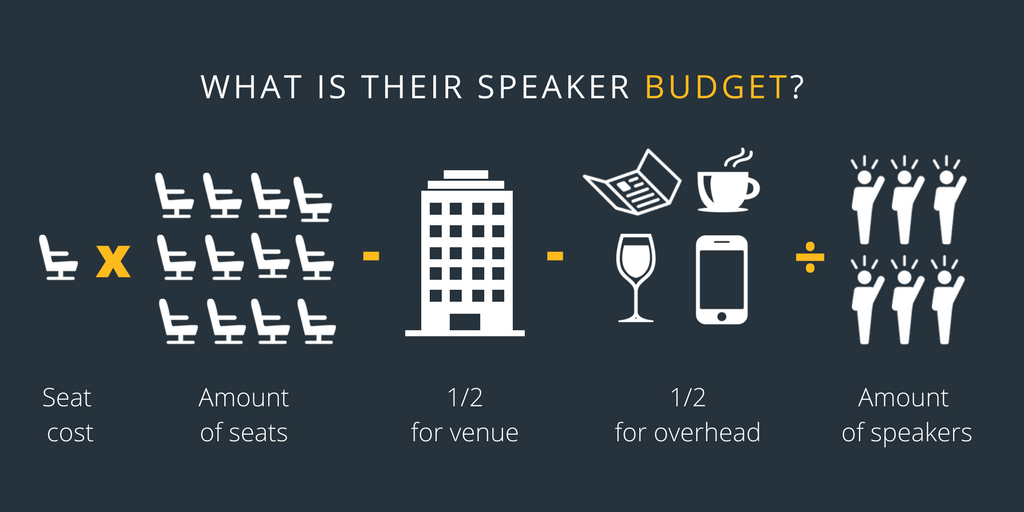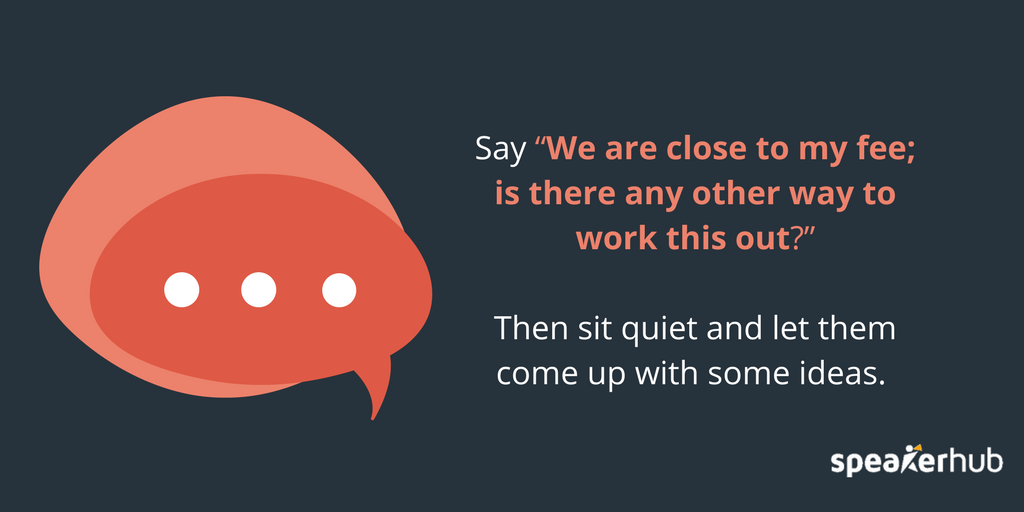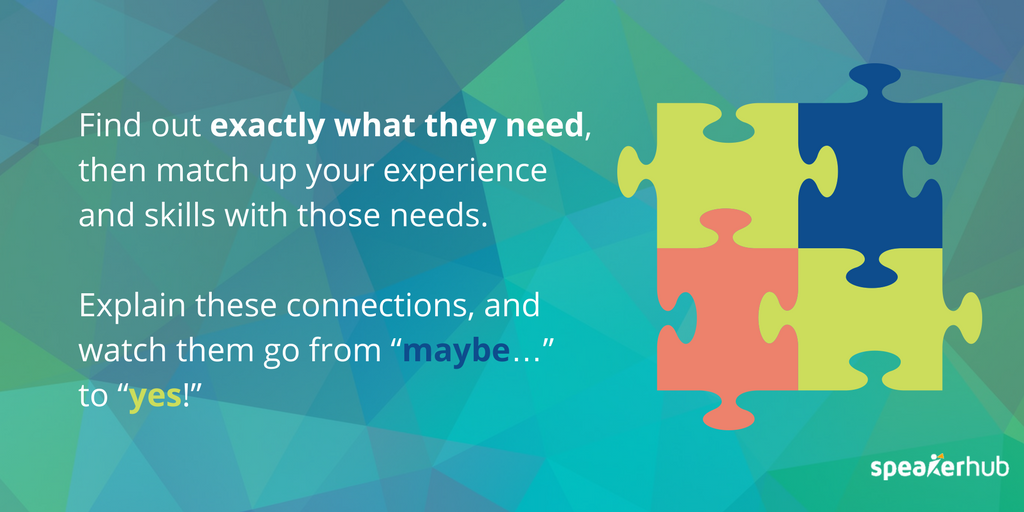A guide to negotiating your speaking fee

One of the questions we hear speakers asking a lot about is fees.
Can you actually make enough money to sustain your business?
While there are as many different perspectives and outlooks as there are speakers, trial and error are the best teachers. We would like to lay some basic guidelines for that moment when you have a potential speaking event in the works and the topic of money comes up.
This guide will break down:
-
Why doing your research about the event is a pre-negotiation must.
-
Setting your walkaway terms.
-
How to make the event organizer want you before you even talk about price.
-
5 effective negotiating tactics.
-
How to walk away with extras.
Before you start, do your research.
Before you even get to the negotiating table, you have to know what you are working with.
For example, imagine, you are going to speak at an event in another city that will pay you $2,000 plus full access to the event. It will take you 3 days to prepare the material, 1 day to travel before the event, 1 day for the event, and 1 day to travel after the event. Imagine, the travel will cost you $500. Then, If you divide up the remainder to a daily fee, you are looking at making $250 a day.
Is this enough to cover your overhead?
Are you making enough to sustain your business?
Know what terms you can accept and what is possible for them. Figure out what you would need to make it possible and what their budget and extras are to make you a stronger negotiator.
Estimating their speaker budget
To start, look at what they are charging attendees.

For example, if a seat at the conference is $500 per ticket, and they are going to have roughly 1,500 people attending, their gross budget is going to be around $750,000.
Now, cut that number in half for the cost of the venue. So, $375,000.
Cut that number again for overhead costs. So, $187,500.
This is potentially how much of a budget they have for speakers.
Find out how many speakers they are going to have, and then divide that budget between the number of speakers. For example, they are looking to get 30 presenters to speak. This means that each speaker should be getting roughly $6,250.
This should give you a ballpark figure of how much they are able to pay you.
Have a fee, and stick to it.
Consider this: you are an event organizer, and you’re looking to hire speakers for your event. You have a rigid budget of $5,000 per speaker, and a few great speakers in mind who you’d like to invite.
You go to one of the speakers and ask them how much they would charge for a 40-minute talk, and they say $15,000.
You love the speaker, but you simply cannot afford their asking fee. So, you write to them and explain that they are simply out of your budget.
Meanwhile, you start emailing other speakers.
The first speaker emails you back and says, “Ok, what if I took $10,000 off the price, would that work?”
While it would work, suddenly, you don’t have a great feeling about the speaker.
It’s as if the price they had offered you was greatly inflated-- like they were just trying to get the maximum amount of money out of you.
You don’t feel good about it. What are you really paying for here?
One of the other speakers you were interested in emails you back, and at this point, you think you might be better off going with them because your trust is intact. With the speaker whose pricing was all over the place, you’ve already lost some confidence in them and feel unsettled.
This is why it is important to have a set fee, or that you can make the same amount in returns. You are clear, and you don’t budge.
Best Alternative To a Negotiated Agreement (BATNA)
In the last section, we mentioned “returns”. What we are talking about is benefits outside of money, and this is where you get to be really creative.
Create a list of things that you would accept, outside the cheque, that would help and benefit you.

Sometimes, some events simply will not have the budget to afford your fee. They are not hiding or pulling a fast one on you; they just don’t have the money.
But, just because they don’t have the money doesn’t mean they have nothing to offer.
Take this example: your set speaking fee is $5,000 for a keynote. You are emailing back and forth, and it turns out the conference only has a speaker budget of $2,000.
You can get very technical about this. Do the math. Say the audience is 300 people, and you have a book that wins you $10 for every copy sold. You could ask the conference to buy a book for each attendee. This would earn you an additional $3,000-- meaning your set fee is taken care of.
Alternatively, you can play it less technical and more creative. For example, you could say, “I understand you don’t have money to cover my speaking fee, but I want to work something out. I would love to have lunch with the CEOs of your two main sponsors. Or, I would love to have a 20-minute meeting with the senior VP of your organization.” While there is no guarantee that this will turn into dollars, you are buying face-time with people who could make a large difference in your speaking career.
When negotiating, and you haven’t been able to make up your fee, simply ask them to make up the difference somehow.
Say, “We are close to my fee; is there any other way to work this out?”
Then, sit quiet and let them come up with some ideas.

While you might have been thinking a couple free meals would be sufficient, they might come up with a week long stay at a top hotel for you and a friend, or a retreat to a spa the organization is partners with.
If they can’t come up with any agreeable offers, then you could suggest some ideas like:
- Selling products: as discussed, can you sell your books or other products at the event? Sometimes, this can easily make up the difference of a lower speaking fee.
- Audience: do you also offer consulting? If the attendees are your target audience, and you can make worthwhile, high-profile connections, this can double what you originally wanted as a speaking fee. When negotiating, ask who is in the audience and that the event organizer makes personal introductions.
- Interesting destination and travel costs: offering an extra night or two in a beautiful hotel in a great city, with the cost for a companion to come, can definitely be an unexpected added benefit. You could also ask for food and taxis to be covered, and turn the event into an interesting and exciting travel adventure.
- Branding: don’t forget that events are a fantastic opportunity for branding. See if they can offer you a sponsorship type package to offset their low fee, such as put your logo on their program and website.
Never talk about the fee first
You want them to want you before they know your price.
This is selling at its most basic.
So, how do you get them to want you? By boasting about all the things you’ve done? Giving them a rundown of all the great events you’ve spoken at? Telling them that you are very, very busy, but you think you could squeeze their event into your schedule?
The first thing you should be asking is how exactly you can use your expertise to help them.
Ask a lot of questions, find out exactly what they need, then match up your experience and skills with those needs. Explain these connections, and watch them go from, “maybe…” to, “yes!”

Let’s look at a list of questions you can ask before starting the negotiation:
-
Tell me about your event.
-
Who is your audience?
-
Are they paying to be there?
-
How many speakers do you have?
-
What kind of results are you looking for from your speakers?
-
When would I be speaking?
You have to spend some time really figuring out what it is that they need and want.
Once you know these things, selling yourself to them becomes much easier.
Still not sure which questions to ask? Jump to this article: 35 Expert questions to ask event organizers before accepting to speak
5 Key negotiating tactics
You’ve done all your research, you’ve asked all the questions. You are ready to start talking about the money.
Chris Voss was the lead international kidnapping negotiator for the FBI, founder and CEO of The Black Swan Group, and author of “Never Split the Difference”, has some fantastic insights on how to negotiate effectively. Use these techniques in your next negotiation.
1. Mirror words selectively and purposefully.
During the question asking time, repeat the last few words the organizer said back to them.
It will quickly build rapport and make them feel comfortable.
Highlight important words, and when you are talking about what you can do, use those exact same words.
For example, they say, “We are looking for a speaker who understands the European Market and the current economic trends and risks Europe faces in 2019.” You could say, “So, economic trends? Risks specifically for Europe?”
Then, when you are talking about your talk or workshop, loop those exact same words back in: “In the third section of my talk, I look at the risks Europe’s economy will be facing in the next few years.”
2. Practice tactical empathy.
The idea here is to connect on a deeper level of understanding with the event organizer.
You want to stop them from feeling like they are trying to get something from you, or that you are trying to get something from them. Rather, make them feel you understand each other and are on the same side.
So, how do you do that?
Directly label their fears. If you hear a concern, don’t avoid it or brush over it, bring it to light and counter it.
Use phrases like, “It sounds like you are afraid of…” or, “So, you’re concerned about…” will go a long way in beginning a proactive working relationship.
3. If you are going to push for anything, make it a “no”.
You want the event organizer to say, “yes” and, while it may seem counter-intuitive, one of the best ways to get that, “yes” is to get a few, “no”’s first.
When someone feels like they are being pushed into a, “yes”, their defenses go up.
But, saying, “no” makes the event organizer feel in control, and this can work to your advantage. Triggering this feeling of control will actually help you.
Whenever possible, aim to ask no-oriented questions, like: “Is now a bad time to talk?” and, “Have you finished hiring your keynote speaker already?”
Then, when the time comes for the big question, you are more likely to get a, “yes.”
4. Start triggering a "that's right" feeling.
You want the event organizer to feel like you are on the same page, and that you can help them achieve their goals. One way to do this is to trigger a, “that’s right” feeling.
Do this by summarizing and reaffirming how they feel and what they want.
Make connections they might not have made already. This can create subtle epiphanies that confirm that you not only understand where they want to go, but you will help them get there.
5. Taking control by giving control to them.
If you want to gain the upper hand in a negotiation, make sure that the event organizer feels like they are in control the whole time. The moment they start to feel like you are pushing them, they will work extra hard to keep their hand.
Break this down by making sure they know they are in control. Focus instead on getting a clear picture of exactly how you can help them.
Once they are convinced you are the best person to help them get what they need, you can start talking about what you need to make it happen.
The above techniques focus on using emotional intelligence over logic and reason. By addressing their needs and desires, you are more likely to gain a competitive edge over other speakers when it comes to getting what you need.
While it will take some time and practice to find a negotiating technique that suits you, the above techniques will help guide you to start getting paid what you need to build your business and sustain your speaking career.







